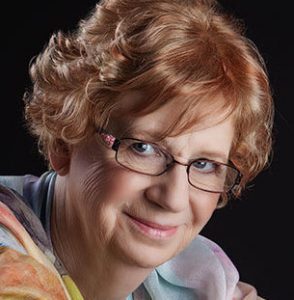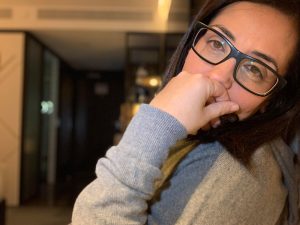New President greets members
by Stephanie Holt
What a privilege it is to write this message for members, my first as Branch President. I hope to meet more of you (virtually, for the time being) over the coming months. The welcome and support from members so far has been a wonderful affirmation of the energy, goodwill and collaborative spirit within our profession.
Over the past month, Editors Victoria offerings have continued to support our members, whether through Zoom events or from the steady flow of fascinating information shared on social media. Like many, I suspect, I start my day with coffee in hand and Facebook on the screen. This is often quite invigorating — and that’s not just the caffeine. Thanks to Editors Victoria, I’ve been delving into the intriguing specialist genre of fan fiction, been reminded of the importance of protecting our physical wellbeing (Stretch! Get up from that desk!) and pondered many a tricky grammar dilemma. All of which distract me from frustration at the apparent collapsing distinction between ‘simplistic’ and ‘simple’ — but that is another story.
Behind the scenes, the new committee has been planning for the months ahead. I thank the 2019–20 committee, the continuing members of the committee and subcommittees, those experienced members who have stepped into new roles for 2020–21, the new members who have joined our subcommittees, and our new student representative. We are also pleased to confirm Susan Pierotti as our new Accreditation Board Delegate. Susan will bring great knowledge and insight to this important role.
While many unknowns are ahead, there is also strong commitment to working together for the good of the profession and our members. Training and information to help those preparing for December’s accreditation exam is a priority at the moment. Those planning to sit the exam may want to consider the punctuation refresher being run by Ann Philpott in October. Bookings are now open.
These are tough times in Victoria, and toughest of all in Melbourne. There may be some comfort in falling COVID-19 infection numbers, but isolation, restrictions and curfew are taking a toll. While editing is often a solitary undertaking — even caricatured as an antisocial one — connection and mutual support can make a huge difference in coping. Whether that is through reading, listening or working (virtually) together, those connections are more important now than ever.
So take care, and may spring bring its brightness and optimism to the days ahead.
Stephanie
edvic.president@iped-editors.org
Vale John Bangsund
by Stephanie Holt
Just as this newsletter was being finalised, news reached us that John Bangsund had died, at 81, on 22 August. John had been in poor health for some years, but it was the coronavirus that took him in the end. Our thoughts are with his wife, Sally Yeoland, his wider family and his many friends.
While fuller appreciations and memories will undoubtedly flow over coming months, an initial tribute is in order.
John was a legendary editor, indeed an editor’s editor (or is that editors’ editor? John would have had some thoughts on that), and an Honorary Life Member of the Victorian Society of Editors. Those who didn’t work with him might know him as the inventor of Muphry’s Law (more on that later), as editor of the Victorian Society of Editors newsletter for many years, or as a writer of marvellous columns and essays. A lovely example of his writing — once a staple of trainee editor reading lists — is On Looking It Up: A Ramble on Books and Editing, first published in Meanjin in 1994).
Read the full tribute here. [PDF, 91KB]
New members
EdVic is pleased to welcome members who have joined or upgraded since the last issue of Gatherings. They are our new associate members Adrian Joseph Rigoni, Anthea Wynn, Elizabeth Carr, Ingunn Karin Downie and Liz Monument, and our new student members Nadia Pitisano and Sarah Crafter.
We look forward to seeing you at our workshops and events and encourage you to make the most of IPEd’s networks for news and support.
New member profile: Anthea Wynn
Q: How long have you been an editor and how did your career begin?
A: I have been a self-editor for maybe 30 years, both in the corporate world in the consumer credit industry in the UK, and for the past 10 years editing my own and other people’s books. In the credit world I was a freelancer in marketing communications, writing everything from brochures to articles to conference papers to a textbook. All of these required self-editing and, looking back, I’m not sure I was particularly good at it, but I learned as I went along. The high point of my career was Launch Editor for the now-defunct Credit risk international journal in 2002.
Q: What type of editing makes up most of your work?
A: Structural editing, for my own books. I am a channeller, and for 10 years I have been receiving biographies of Christian elders, all of which need massive amounts of editing of every kind. I have just discovered PerfectIt, which will make the process faster, easier and more efficient.
Q: What aspect of the profession do you find most challenging?
A: Working alone, in the sense of not having another editor or writer to bounce ideas off. To improve my skills, four years ago I did a Diploma in Professional Writing and Editing and I learned heaps. Despite being the ‘granny’ of the class, I had a ball.
Q: How would you like to build your skills as an editor?
A: Insights into structural editing that are outside the box.
Q: What do you like about being a member?
A: The potential for attending training courses and workshops and the attendant learning, and also meeting like-minded souls.

Anthea Wynn
[Photo credit: Urban Life Photography]
New member profile: Nadia Pitisano
Q: How long have you been an editor and how did your career begin?
A: Technically, I’m just starting out. I’ve recently returned to study, after a long hiatus, to complete my Certificate IV in Professional Writing and Editing.
Q: What type of editing makes up most of your work?
A: I write a blog, where I dabble in poetry and creative nonfiction. I also craft my own content across social media platforms. I do all my own structural editing, copyediting and proofreading.
Q: What aspect of the profession do you find most challenging?
A: I intuitively know my way around a piece of writing, but I’m part of the ‘lost generation’ of grammar. This means I have some gaps to fill in my knowledge of grammar rules, which is why I’ve gone back to school.
Q: How would you like to build your skills as an editor?
A: I read broadly and voraciously, so I can get a sense of what a good piece of writing looks like. I’m also keen to try my hand at writing in various registers and styles to build my skills as an editor.
Q: What do you like about being a member?
A: Being an IPEd member connects me with other editors and also gives me access to an invaluable mentoring program.

Nadia Pitisano
Editors Victoria workshop: Advanced macros with Kevin O’Brien
by Dalida Boustead AE
Many of the repetitive tasks that take up an editor’s time and energy can be automated by running macros. They are a great tool but can be a little bit tricky, so it helps to have some guidance and hands-on assistance with writing them. It’s no surprise, then, that the most recent Editors Victoria workshop, Advanced macros with Kevin O’Brien, was a sold-out event.
Kevin is the Managing Editor at Scribe Publications and an experienced Microsoft Word teacher. During the two-hour session held via Zoom on Saturday 1 August, he shared his knowledge of macros with both PC and Mac users from around Australia.
Kevin covered topics such as recording, writing and annotating macros, broken up with exercises for participants to put what they were learning into practice. As one attendee put it, ‘Kevin O’Brien teaches Word like my dad taught me how to ride a bike; patiently and clearly, knowing that the end result will be success’.
One of the first tasks was to record a viewing-options macro, which automated the process of adjusting a document’s size, margins, proofing language and even preferred document zoom setting. Other macros, including those for transposing letters and turning on tracking, were written and adjusted in the Visual Basic for Applications (VBA) editor.
Throughout, Kevin provided great advice and tips; for example, highlighting the importance of backing up the Normal template (or how not to lose your macros when Word updates). We were in safe hands with Kevin patiently troubleshooting the inevitable tech issues that arose.
‘An energising and enlightening workshop’ and ‘Informative’ were the comments from a couple of participants, while another summed up the workshop as, ‘A valuable overview of macros for editors, including writing VBA code. As a macro novice, I found it highly useful for my editing work’.
We thank Kevin O’Brien for his expertise, encouragement and calm presence throughout this practical and enjoyable workshop.
Dalida Boustead is a freelance editor and member of the Professional Development subcommittee.
Upcoming course
Punctuation refresher: solving tricky issues
Dates: Saturday 17 October (2-hour workshop) and Saturday 31 October (1-hour workshop) 2020. Note: Both workshops are included in your booking.
Time: 11am-1pm AEDT Saturday 17 October and 11am-12pm AEDT Saturday 31 October 2020.
Cost: IPEd Members AUD90; Affiliate members (Writers Victoria, ASTC, ANZSI, CIEP) AUD90; Non-members AUD120; Student members AUD54 (This fee covers both sessions.)
Venue: Online via Zoom meetings. Details will be emailed to participants prior to the first session.
Bookings close: Thursday 8 October 2020
Book here.
Are you unclear on when to use different types of sentence punctuation? Unsure of current uses of the apostrophe? Need advice on placing multiple punctuation marks at the end of sentences? If you answered ‘yes’ to any of these questions, this refresher course is for you. It will increase your confidence that your use of punctuation is up to date. The course will be taught by Ann Philpott and held in two parts: a two-hour workshop with instruction and interaction (17 October) and a one-hour follow-up workshop with questions from participants, exercises and interaction (31 October).
September meeting
Imitation is art: editing fan fiction and adaptation
Date: Thursday 24 September 2020
Time: 6pm to 7pm AEST plus Q&A
Local start times
NZ: 8pm NZST
Norfolk Island: 7pm NFT
Tas/ACT/Vic/Qld/NSW: 6pm AEST
SA/NT: 5:30pm ACST
WA: 4pm AWST
Venue: Online via Zoom meetings; all registrants will receive the Zoom meeting link before the event
Cost: IPEd members AUD10, non-members AUD15
Bookings close: Tuesday 22 September 2020
Book here.
Presenter: Jes Layton
Jes Layton is the Media, Communications and Administration Coordinator for the UNESCO Melbourne City of Literature Office as well as Express Media. He is a writer and artist with work found in Junkee, Voiceworks, Kill your darlings, the AZE journal, Concrete queers, the Victorian writer, Enby life, and scattered elsewhere online. Jes has presented at a variety of Victorian and national writers festivals unpacking queerness, fandom and pop culture. Her story ‘Chemical Expression’ was published in Underdog: #LoveOzYA Short Stories. Find Jes online at @AGeekWithAHat.
Outside of having several essays and pieces published contextualising exploring fan fiction for those who may not be familiar, Jes has also participated in panels and headed reading events, workshops and Q&As about fan fiction and digital literature at various events, including Melbourne Writers Festival, Sydney Writers Festival, Jes Layton
Emerging Writers Festival, National Young Writers Festival and Digital Writers Festival; the last being an online tour of some fanfiction sites and platforms you can find here (from early 2017).

Event description
Fan fiction is among one of the most hotly debated subjects in the world of literature, with just as many readers and writers praising it as condemning it. As polarising as it may be, fan fiction has been, and continues to be, the bread and butter of some of today’s most successful authors: E L James, Cassandra Clare, Marissa Meyer, Neil Gaiman, Dante. But what is fan fiction exactly? And what is the role of the editor in this unique and historic form of writing? Writer and artist Jes Layton will take you from the roots of fanfiction and its emergence into the public sphere, to covering practical insights into working with fanfiction alongside a casual discussion of the impact the internet is having on the writer/editor relationship.
‘Fan fiction is not only the start or “practice mat” of many writers’ and editors’ creative journeys but is a growing, diverse and boundary-pushing form of writing all on its own.’
This event may be recorded and shared with or purchased by other members and non-members. Attendance at this event confirms that you are aware of this.
